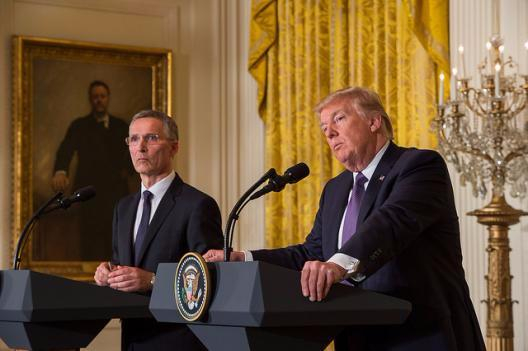 If the upcoming May NATO summit is to have real benefit, some “new solutions” will be important both with respect to allies’ commitment to spend at least 2 percent of their GDP on defense and on a stronger role for NATO in counterterrorism. Between now and May, however, no country will have the time to reach the agreed level of defense spending, nor will NATO undertake significant new counterterrorism missions. But what NATO can do is agree to two effective initiatives: first, a multinational deterrence initiative focusing on the Russia threat (the driver for increased spending) and second, establishing a coalition counterterrorism framework around which to build consequential counterterrorism efforts in the Middle East. Such efforts would not only be responsive to U.S. calls for action but would substantially increase the security of all NATO nations….
If the upcoming May NATO summit is to have real benefit, some “new solutions” will be important both with respect to allies’ commitment to spend at least 2 percent of their GDP on defense and on a stronger role for NATO in counterterrorism. Between now and May, however, no country will have the time to reach the agreed level of defense spending, nor will NATO undertake significant new counterterrorism missions. But what NATO can do is agree to two effective initiatives: first, a multinational deterrence initiative focusing on the Russia threat (the driver for increased spending) and second, establishing a coalition counterterrorism framework around which to build consequential counterterrorism efforts in the Middle East. Such efforts would not only be responsive to U.S. calls for action but would substantially increase the security of all NATO nations….
First, adopting a multinational deterrence initiative provides a way for NATO allies to undertake critical defense initiatives comparable to U.S. defense investments in Europe. Under the initiative, allies would collectively match the $3.4 billion defense fund of the U.S. European Deterrence Initiative, which is focused on forward defense of the Baltic nations. Allies are deploying national units to form a multinational battalion in each of the Baltic countries. By pooling their national efforts under the multinational deterrence initiative framework, plus other key expenditures such as reinforcement requirements, as well as air, maritime, and cyber capabilities focused on Baltic defense, allies will account for much of the $3.4 billion they need to match America’s investment in NATO’s front-line states. Just as important, allies will also demonstrate that while they may not yet reach NATO’s 2 percent defense spending goal, they are serious about the need to enhance collective defense in Europe.
Funding for the multinational deterrence initiative meets the critical need for NATO to improve its deterrence to the Russian threats. While the multinational battalions in the Baltic nations and Poland are highly important steps, the war-fighting capability of a battalion is limited unless reinforced. The multinational initiative would provide the funding for the necessary reinforcement of NATO’s new forward presence….
A coalition counterterrorism framework would provide a strategic basis for NATO to improve its role in fighting the growing terrorist threats from Europe’s southern borders. Just as Germany would head a revised NATO Response Force for the East, as part of the coalition counterterrorism framework, France could head a south-oriented Response Force. Such a new organization could work closely with countries of the region including the counterterrorism coalition that Saudi Arabia is seeking to effectively organize. Likewise, a coalition counterterrorism framework could incorporate the stabilization and reconstruction framework now headed by Italy, which could maintain the lead for that effort, and integrate counterterrorism efforts with stabilization efforts, two areas that significantly overlap as experience in Afghanistan and Iraq has demonstrated. Planning for a post-Islamic State-group Syria – at least for its eastern part – and for Libya could take place under the auspices of the proposed framework. The recently established “hub” that NATO has created for the South to provide intelligence and analytic support would be integrated with the coalition counterterrorism framework. Finally, the coalition counterterrorism framework could organize defense capabilities training and support for countries like Jordan and Iraq….
Franklin D. Kramer is a distinguished fellow and board member at the Atlantic Council and a former assistant secretary of defense. Jorge Benitez is director of NATOSource and a senior fellow at the Atlantic Council.
Image: Secretary General Jens Stoltenberg and President Donald Trump, April 12, 2017 (photo: NATO)
